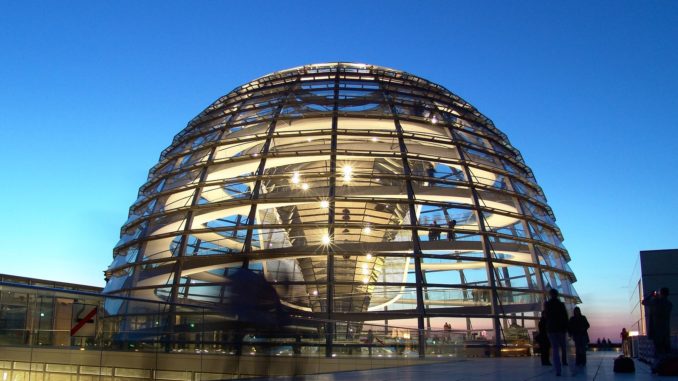
In an unusual move that could eventually have implications for legal tech companies across the EU, a German political group has proposed new regulation for platforms that have encroached on what they see as the regulated provision of legal services. In particular they are targeting automated platforms that guide people through a legal claim process.
The move has been inspired by consumer-facing websites that provide services such as helping you to claim compensation for flight delays, or where they group claims together to make a type of consumer class action.
On one level an argument can be made for supporting legislation that governs the provision of ‘legal advice’ or assistance by those who are not actually lawyers, especially where automated systems are in place.
But…..there is also a big potential problem……how do we define ‘giving legal advice’ as opposed to just supporting an individual or giving information to someone in relation to a legal matter?
And, how are we defining ‘legal tech’? Under the German politicians’ apparent definition (see below) this seems to mean web-based platforms that engage with consumer legal issues. But, is that the official limit of the term? Where does ‘legal tech’ begin and end from a regulatory perspective?
Moreover, how do you define the group who are using these tools? At present the focus is on individuals who use automated legal platforms, but what about SMEs, or larger companies? Where does the proposed regulation end?
It’s arguable that, for example, a legal research system that gave individuals, or companies, information about legal matters via a tech platform, could come under this regulation. And, what about other types of tools that help guide people through the creation of legal documents? What about automated smart contract-based systems that automatically pay out compensation, such as Fizzy?
Would AI review tools administered by a team of paralegals in an LPO come under the ‘unregulated legal tech advice’ umbrella? Perhaps not, but as we all know, legislation can often be a very imprecise instrument, leaving loopholes and dragging in those who should perhaps be left out.
Finally, if a country of Germany’s importance in the EU moved in that direction then it’s not unreasonable to expect others in Europe to follow a similar clampdown on ‘legal techs’ – depending on how they are defined by the law, and perhaps we may even seen a pan-European Directive see the light of day at some point.
Much is unknown, but there is also much at stake – in part because the frame of reference is still being developed. So, it was great to find that German lawyer, Philipp Plog, a partner in UK-based law firm Fieldfisher had just written all about what is happening and what it could mean.
—
Germany’s Free Democratic Party (FDP) wants to move Legal Tech providers out of the legal grey zone and create modern legislation for legal services.
It is a long-overdue measure that could bring an end to the roadblock mentality of certain actors in the market, writes Fieldfisher partner Philipp Plog.

The FDP faction in the German federal parliament was the first German party to propose the legalisation of ‘automated’ legal consultations – legal advice given by people or entities that are not lawyers.
This is exactly what the federal government had rejected last November in response to a minor query, ‘Legal Tech – legal bases’ (Bundestag document no. 19/5438).
The FPD is attempting something completely new with its draft law: It aims to close the gap between those who are not regulated lawyers and the regulated lawyers, by providing the former more legal certainty and the latter more leeway in terms of professional regulations, which would be a paradigm change.
The discussion is stalled at the moment as the actors fight over the old system. German laws governing the profession only recognise legal advice provided by lawyers, with only a few very specific exceptions.
The FDP is specifically proposing a tiered regulation modelled after the German Legal Services Act (RDG) that would introduce Legal Tech companies to the liability model of lawyers and subject them to the judicial oversight of the German federal states.
It also wants to lift the ban on lawyers charging success fees to their clients and concluding commission agreements with client finders. Currently lawyers are not permitted to take risks with their clients or share their fee with others.
Legal Tech providers are creating more competition for lawyers
The economic opportunities are enormous, especially in such a highly complex legal system like the one in Germany. Within just a few years, Flightright – (a web-based. consumer website) – was able to win five leading judgments of the German Federal Court of Justice and another five before the European Court of Justice – all in favour of flight passengers who received compensation from airlines for flight delays and cancellations.
According to German consumer organisation Stiftung Warentest, the enforcement of rent control rights through the service wenigermiete.de has accounted for many successful cases in tenancy law.
In addition, the lawyers of the Legal Tech firm Rightmart were able to enforce adjustments out of court in 45 per cent of the decisions concerning Hartz IV, a long-term unemployment benefit. Furthermore, German newspaper Die Welt reported that nearly 40 per cent of all Hartz IV lawsuits brought before the social welfare courts were successful.
Some Legal Tech providers that enforce the payment claims of users for a commission develop enormous negotiating power because they pool the claims financially by means of assignment to a vehicle (as German law does not technically know class actions).
Furthermore, they build up their legal expertise through scaled case numbers, allowing them to go up against big opponents. They assume the user’s cost risk and give him someone to fight for him in exchange for a part of his winnings upon success. Moreover, they may receive financing from third parties. Lawyers are currently not permitted to do either.
These companies have begun to provide users with access to legal areas where lawyers would rather not go. They often started off in exotic areas that are of little interest to lawyers due to the low amount in dispute – for example, objections to Hartz IV unemployment benefits or speeding tickets.
But these providers are now gradually moving in on legal areas that also lend themselves to being handled on a large scale: tenancy law, dismissal protection and damage claims in the diesel scandal. That is why things are now heating up.
Status quo is impeding further development
Lawyers in Germany currently enjoy a quasi-monopoly, which appears comfortable at first sight. However, it has led to individual law firms and the German Bar Association (DAV) barricading themselves inside the current system, even though the new actors have also generated many clients for lawyers, as they are not allowed to appear before the court. It’s a tragic roadblock considering the situation in the UK and the U.S., where flexible regulatory systems are fuelling the economic development of Legal Tech within and outside of law offices.
Stanford University’s online overview ‘CodeX LegalTech’ names the U.S. as the global market leader and the UK as the number one in Europe. The legal framework for lawyers and alternative providers in the UK has been liberalised over the past several years, allowing success fees and outside capital for law firms.
Not so in Germany. For a long time, the German Bar Association remained silent at first before declaring on 26 April 2019 that it would ‘do everything in its power to oppose the authorisation of non-lawyers to provide legal advice’. And some bar associations, in particular the Berlin bar association (RAK), are carrying out unfair competition proceedings against the new actors.
The German federal bar association (BRAK) has not yet taken any formal position. However, Frank Remmertz, chairman of the Legal Services Act committee, is campaigning in a confidential paper for the bar, as a powerful lobby, to obtain the right to shape the new legislation. But it may soon be too late for this if the Federal Court of Justice (BGH) takes the initiative away from policymakers in the dispute surrounding wenigermiete.de on the scope of the collection license (hearing scheduled for 12 June 2019) and “Myright” on the accusation of a conflict of interest among collection service providers that also provide litigation financing.
Collection registration is a legal crutch
In order to launch their product on the market, many Legal Tech providers operate as registered collection services in compliance with the (German) Legal Services Act. It allows for the provision of legal advice for the purposes of enforcing claims and as such is only a legal crutch.
Much remains unclear, such as whether the status of collection service provider only covers the current claims or also claims in the future that could arise with regard to rent control or rescinded life insurance policies, for example.
It is also unclear whether it is permissible to combine collection activities and litigation funding, or whether violations of the Legal Services Act can also break the client relationship procedurally under civil law, which would result in the time-barring of client claims. These questions are not new, and some have been submitted to the German Federal Court of Justice.
It is strange that the federal government has left these issues for the courts to decide and declined to redesign the framework of an extremely dynamic economic area. It is obvious that the current legal framework cannot be sustained in the future. And it raises constitutional issues, since it requires sound justification to reserve legal advisory activities for a specific professional group. This was the argument last used by the German Federal Constitutional Court to expand the field of permitted collection services in the early 2000s (ruling dated 20 February 2002, ref. 1 BvR 423/99 and ruling dated 14 August 2004, ref. 1 BvR 725/03).
Commission-based model versus consumer protection
Behind the political paralysis, there is in fact unease surrounding commission-based models such as those practised by Legal Tech providers. Until now, the coalition has relied solely on traditional consumer protection. Institutions like the consumers’ association are state financed, which is how they ‘protect’ consumers’ wallets. Unlike Legal Tech providers, they do not build up expertise in specific areas, nor do they have the same leverage when it comes to enforcing claims against powerful opponents through scaled case numbers.
The individual enforcement of claims and the cost risk ultimately remain with the consumer. This is also one of the main difficulties in the very recent “model declaratory action” (Musterfeststellungklage), a German light version of a mass procedure where consumer protection associations can seek declaratory relief on behalf of groups of consumers. This regime was introduced from November 2018 to make sure that consumers can act against Volkswagen as regards manipulated Diesel-engines. However, even if such an action is successful, consumers are only able to gain redress by bringing another, separate action for payment.
The FDP proposal is hopefully the beginning of an exciting debate. The idea of subjecting non-lawyer legal consultation to a traditional administrative supervisory regime like the Legal Services Act is a reasonable one. It can also be found in the proposals of the German Startup Association and of BRAK representative Remmertz.
Is it about automation or the quality of the Consulting?
However, the proposals differ when it comes to what the basis for justifying the permission should be. Is it really the ‘automation’ or ‘partial automation’ of the consulting services? This in itself will not guarantee the quality of consulting services. The aim is not to grant special privileges to ‘legal machines’, but rather to improve access to legal services in cases where it makes sense to process a large number of similar claims in a structured way.
The focus should therefore not be on the degree of automation, but instead on the quality and ongoing auditing of the providers and the development of a liability and liability insurance framework. At least these considerations are included in the FDP draft, which states that ‘qualified persons’ must cooperate in creating and monitoring ‘the processes for the provision of automated legal services.’
Once the procedural framework is nailed down, there is not much left to hold Germany back from authorising non-lawyer legal services to provide out of-court legal consulting, as is already the case in Switzerland and Scandinavia. Germany needs to take the plunge!
—
Philipp Plog is Partner at Fieldfisher. He represents several Legal Tech companies in Germany, including some of those mentioned in this article. He also contributed to the position paper of the German Startup Association (BVDS) on regulation in November 2018 and acts as counsel for its Legal Tech platform.
More information: https://www.lto.de/recht/zukunft-digitales/l/fdp-gesetzentwurf-legal-tech-rechtsdienstleistungsrecht-modernisierung-kommentar/

2 Trackbacks / Pingbacks
Comments are closed.